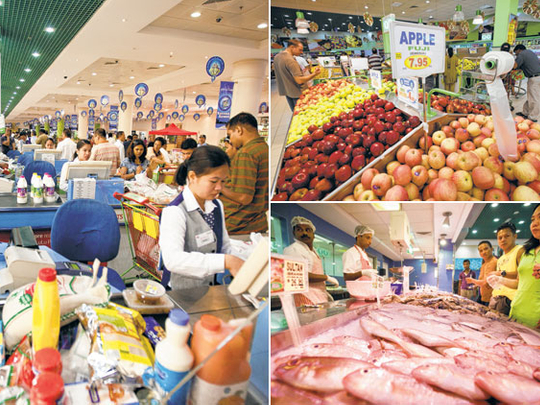
Simple ways to save those fils by changing shopping habits and being aware of the deals on offer
Plan your shopping
As with all aspects of personal finance, it is important that you plan your grocery shopping to ensure you don't blow your monthly budget. Check what's missing in the fridge or pantry and make a list of the things you need before you head out to the grocery store. This way, you're leaving no room for impulsive purchases — you will buy what you actually need than what you think you need, advises James Thomas of Acuma.
Shop around
If time permits, visit different supermarkets and find out what special offers are in store for you. You will be amazed to see just how much savings you will make if you look really hard. To make your bargain hunting easier, huge supermarkets usually run a newsletter that serves as a catalogue of discounted items, make sure you secure a copy before you grab the cart. Knowing which stores offer the best deals can make your monthly salary go a long way. Edith Rollan, a Filipino expat, buys her grapes from a Lebanese store for Dh14 to Dh16 per kilo, compared to Dh20 to Dh22 per kilo in other supermarkets. For fish, vegetables, oil, shampoo and other essentials, she saves 50 fils to Dh3 on each item buy shopping at Al Nahda supermarket in Sharjah.
Go traditional
It's very convenient to shop at the nearby grocery or supermarket next door, but if you feel like you need to stock up on the perishables, it doesn't hurt to go out of your way to visit the traditional markets. Thomas recommends the fruit and vegetable market or the fish market where you are not only guaranteed to find fresh produce, but cheaper prices as well. "And you get to experience a side of the UAE that you rarely see," Thomas says.
Buy in bulk
Lynessa Serrao from India says you can actually save Dh15 if you buy two packs of diapers together rather than pick a single pack. "I started to buy in bulk when my babies arrived. The other things that I also take home in big packages or containers are rice, oil, baby wipes and other consumables," she says.
Go local
When buying fresh fruits and vegetables, locally grown products will save you loads. Take cabbage, for instance. The locally produced ones, depending on the size, can cost anywhere between Dh4 an Dh8. "But if you choose the ones from Europe, you'll get a small piece for Dh20 to Dh28. That's a huge difference," Serrao observes.
Trim down the choices
Abbi Thirion from the UK has managed to lower their grocery bill from Dh3,000 a month to between Dh2,100 and 2,400, thanks to tighter shopping habits. A tried and tested trick is minimising the choices or reducing the amount of treats such as biscuits, chocolate and puddings. The Thirions also alternate the meats they take each week. For pasta and tinned goods, she finds it wise to switch to cheaper brands.
Freeze meals
Since her second son was born in April last year, Elaine Stannard from the UK started freezing meals to reduce food costs. For over a year now, she's been cooking big batches and freezing individual meals. "It does cut down on costs and my boys get to eat healthy home-cooked food most of the time, even if it's frozen," she says.
Switch supermarkets
Stannard used to buy her staples from a high-end grocery store. When prices became heavier on the wallet, she migrated her shopping to Carrefour. She's been reaping savings since then. She now pays Dh6.95 on Kerrygold butter, compared to Dh26.95 at the previous store. Stannard says she's astonished by the huge price difference.
Return to the kitchen and start saving money
Cooking at home is definitely one of the most effective ways to reduce monthly expenses. Homemade meals cost a lot less than the food at restaurants, plus you don't need to worry about giving a tip to the waiter.
You can even bring down your grocery bill further by becoming "kitchen smart." Preparing economical meals, stocking up on ingredients and condiments with long shelf life, and investing in the right kitchenware can save you loads in the long term.
More Café in Dubai suggests some cost-saving tips to help households keep food spending to a minimum:n Stock up on dried thyme, mixed herbs, rosemary and parsley. They will last for quite a while. This doesn't mean you should use all of them in one dish.n Planning family meals on a weekly basis will support your ability to budget and develop trends of how to use the same foods in different meals.n When buying cheese, it is more economical to buy a block of cheese. You then also have the choice to grate or slice as needed. n To save money on bread in the long term, invest in a bread maker. It is also nutritionally beneficial as you don't need all the additives and stabilizers that many bakeries use.
Another food expert suggests cooking simple meals that require less time to prepare and fewer ingredients. "Simplicity is the key. Don't complicate your food. Besides, if you use too much ingredients, you're going to confuse your palate," says Gert Bredenhann, More Café's corporate chef.












